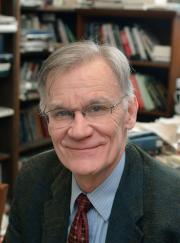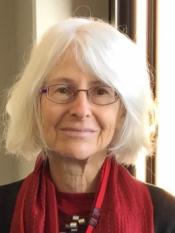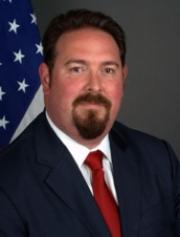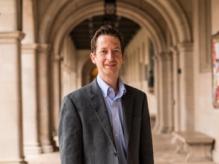Conference Presenters
THURSDAY, NOVEMBER 1
Keynote Address, 5:00-6:30pm
Martina Vandenberg , The Human Trafficking Legal Center

Martina E. Vandenberg is the founder and president of The Human Trafficking Legal Center.
Vandenberg has spent more than two decades fighting human trafficking, forced labor, rape as a war crime, and violence against women. Vandenberg has represented victims of human trafficking pro bono in immigration, criminal, and civil cases. She has trained more than 3,600 pro bono attorneys nationwide to handle human trafficking matters.
A former Human Rights Watch researcher, Vandenberg spearheaded investigations into human rights violations in the Russian Federation, Bosnia & Herzegovina, Uzbekistan, Kosovo, Israel, and Ukraine. She is the author of two Human Rights Watch reports. Vandenberg also co-founded Syostri, one of Russia’s first rape crisis centers for women.
Vandenberg is a Rhodes Scholar and Truman Scholar.
FRIDAY, NOVEMBER 2, 2018
Welcome Remarks, 8:50-9:10am
David Blight, Genevieve LeBaron, Jessica Pliley
 David W. Blight is Class of 1954 Professor of American History and Director of the Gilder Lehrman Center for the Study of Slavery, Resistance, and Abolition at Yale University. He previously taught at North Central College in Illinois, at Harvard University, and at Amherst College. In October of 2018 he Simon and Schuster published his new biography of Frederick Douglass, entitled, Frederick Douglass: Prophet of Freedom. Blight is the author of Frederick Douglass’s Civil War: Keeping Faith in Jubilee (1989); Race and Reunion: The Civil War in American Memory (2001), which garnered eight book awards, including the Bancroft Prize, the Merle Curti Award, the Abraham Lincoln Prize and the Frederick Douglass Prize; A Slave No More: Two Men Who Escaped to Freedom, Including Their Narratives of Emancipation (2008), which won the Connecticut book award for best book in non-fiction; and American Oracle: The Civil War in the Civil Rights Era (2011), which won the Aniston-Wolf Prize in non-fiction for best book on race and racism. He has edited some six books, including editions of Frederick Douglass’s Narrative and My Bondage and My Freedom; W. E. B. Du Bois’s The Souls of Black Folk; and Robert Penn Warren’s Who Speaks for the Negro. Blight is featured in many documentary films on American history on PBS, the BBC, and other networks. He wrote one of the chapters for the book, To Dream A World Anew: A History of the African American People, a companion volume for the opening of the National Museum of African American History and Culture. He writes frequently for the popular press, including the Atlantic, the New York Times, and many other journals. Blight was elected to the American Academy of Arts and Sciences in 2012. His lecture course on the Civil War and Reconstruction Era at Yale is on the internet at opencourses@yale.edu. Blight has always been a teacher first. At the beginning of his career he spent seven years as a high school history teacher in his hometown of Flint, Michigan. He was an undergraduate at Michigan State University and did his Ph. D. at the University of Wisconsin-Madison. Blight maintains a website, including information about public lectures and books, at davidwblight.com.
David W. Blight is Class of 1954 Professor of American History and Director of the Gilder Lehrman Center for the Study of Slavery, Resistance, and Abolition at Yale University. He previously taught at North Central College in Illinois, at Harvard University, and at Amherst College. In October of 2018 he Simon and Schuster published his new biography of Frederick Douglass, entitled, Frederick Douglass: Prophet of Freedom. Blight is the author of Frederick Douglass’s Civil War: Keeping Faith in Jubilee (1989); Race and Reunion: The Civil War in American Memory (2001), which garnered eight book awards, including the Bancroft Prize, the Merle Curti Award, the Abraham Lincoln Prize and the Frederick Douglass Prize; A Slave No More: Two Men Who Escaped to Freedom, Including Their Narratives of Emancipation (2008), which won the Connecticut book award for best book in non-fiction; and American Oracle: The Civil War in the Civil Rights Era (2011), which won the Aniston-Wolf Prize in non-fiction for best book on race and racism. He has edited some six books, including editions of Frederick Douglass’s Narrative and My Bondage and My Freedom; W. E. B. Du Bois’s The Souls of Black Folk; and Robert Penn Warren’s Who Speaks for the Negro. Blight is featured in many documentary films on American history on PBS, the BBC, and other networks. He wrote one of the chapters for the book, To Dream A World Anew: A History of the African American People, a companion volume for the opening of the National Museum of African American History and Culture. He writes frequently for the popular press, including the Atlantic, the New York Times, and many other journals. Blight was elected to the American Academy of Arts and Sciences in 2012. His lecture course on the Civil War and Reconstruction Era at Yale is on the internet at opencourses@yale.edu. Blight has always been a teacher first. At the beginning of his career he spent seven years as a high school history teacher in his hometown of Flint, Michigan. He was an undergraduate at Michigan State University and did his Ph. D. at the University of Wisconsin-Madison. Blight maintains a website, including information about public lectures and books, at davidwblight.com.

Genevieve LeBaron is Professor of Politics and Co-Director of Sheffield Political Economy Research Institute (SPERI) at the University of Sheffield. She is also Co-Chair of the GLC’s Yale University Modern Day Slavery Working Group and a UK Economic and Social Research Council (ESRC) Future Research Leaders Fellow. Her research focuses on the political economy of the global labour market, including current projects on the governance of transnational supply chains, the effectiveness of corporate social responsibility, and the business models of forced labour.

Jessica Pliley is an Associate Professor of the history of Women, Genders, and Sexualities at Texas State University. She is the author of Policing Sexuality: The Mann Act and the Making of the FBI (Harvard University Press, 2014) and co-editor of Global Anti-vice Activism, 1890–1950: Fighting Drink, Drugs, and “Immorality” (Cambridge University Press, 2016). Her articles have appeared in the Journal of Women’s History, the Journal of the Gilded Age and Progressive Era, and the Journal of the History of Sexuality as well as a number of edited collections. She is the co-organizer of the Gilder Lehrman Center for the Study of Slavery, Resistance, and Abolition’s Working Group on Modern Slavery and Trafficking at Yale University and the book review editor of the Journal of Women’s History.
Portrayals of Exploitation and Freedom, 9:15-11:15am
Anna Mae Duane, Zoe Trodd, Eileen Boris, Kieran Guilbert

Anna Mae Duane is Associate Professor of English at the University of Connecticut, Storrs. Her scholarship focuses on children and race in a variety of constellations, including children as both victim and political actors in Puritan trial proceedings; antebellum literature; pre-and post-emancipation slave narratives; contemporary children’s literature; modern anti-slavery materials; and adult popular culture. She is the author of Suffering Childhood in Early America: Violence, Race, and the Making of the Child Victim (2010). She is the editor of two collections, The Children’s Table: Childhood Studies in the Humanities (2013), Who Writes for Black Children? (2017), and Child Slavery Before and After Emancipation: An Argument for Child-Centered Slavery Studies (2017). Dr. Duane is the co-editor of Who Writes for Black Children?: African American Children’s Literature before 1900. (2017) and Child Slavery Before and After Emancipation: An Argument for Child-Centered Slavery Studies (2017), and recently completed her tenure as co-editor of Common-place, An Interactive Journal of Early American Life. Her current project, Educated for Freedom: Two Black Schoolmates who Changed a Slave Nation will be published with NYU Press in 2019. Professor Duane’s work has been supported by a GLC Fellowship, a UCHI Fellowship, two NEH grants and a Fulbright award.

Professor Zoe Trodd is Director of the Rights Lab, a University of Nottingham Beacon of Excellence that focuses on research to help end modern slavery. Her current research focuses on the antislavery movement and survivor narratives. She completed her PhD at Harvard University, co-edits the Cambridge University Press book series Slaveries Since Emancipation, and is a member of the board of Historians Against Slavery.
 Eileen Boris is the Hull Professor and Distinguished Professor of Feminist Studies, History, Black Studies, and Global Studies, University of California, Santa Barbara, Eileen writes on the home as a workplace and racialized gender and the state. Her books include the prize-winning monographs Home to Work: Motherhood and the Politics of Industrial Homework in the United States [Cambridge University Press, 1994] and Caring for America: Home Health Workers in the Shadow of the Welfare State, co-authored with Jennifer Klein, (Oxford University Press, 2012, 2015). She is the co-editor, with Rhacel Parreñas, of Intimate Labors: Cultures, Technologies, and the Politics of Care (Stanford University Press, 2010) and, with Dorothea Hoehtker and Susan Zimmermann, Women’s ILO: Transnational Networks, Global Labor Standards, and Gender Equity (Brill and ILO, 2018). She currently is finishing a transnational history, Making the Woman Worker: Precarious Labor and the Fight for Global Standards, 1919-2019 (Oxford, 2019 forthcoming). She is the President of the International Federation for Research in Women’s History.
Eileen Boris is the Hull Professor and Distinguished Professor of Feminist Studies, History, Black Studies, and Global Studies, University of California, Santa Barbara, Eileen writes on the home as a workplace and racialized gender and the state. Her books include the prize-winning monographs Home to Work: Motherhood and the Politics of Industrial Homework in the United States [Cambridge University Press, 1994] and Caring for America: Home Health Workers in the Shadow of the Welfare State, co-authored with Jennifer Klein, (Oxford University Press, 2012, 2015). She is the co-editor, with Rhacel Parreñas, of Intimate Labors: Cultures, Technologies, and the Politics of Care (Stanford University Press, 2010) and, with Dorothea Hoehtker and Susan Zimmermann, Women’s ILO: Transnational Networks, Global Labor Standards, and Gender Equity (Brill and ILO, 2018). She currently is finishing a transnational history, Making the Woman Worker: Precarious Labor and the Fight for Global Standards, 1919-2019 (Oxford, 2019 forthcoming). She is the President of the International Federation for Research in Women’s History.
 Kieran Guilbert is the London-based Deputy Editor for the Thomson Reuters Foundation, and also leads its coverage of modern slavery and human trafficking. He has produced several exclusives on rising numbers of former child slaves being denied asylum in Britain, labour exploitation on Indian tea plantations stamped slavery free by ethical certification schemes, and erratic development aid spending by the world’s top economies on anti-trafficking projects, as well as a nine-part series on the links between modern technology and human trafficking. The British-Irish journalist previously held the post of West Africa correspondent, based in Senegal, and has covered post-Ebola recovery in Liberia, the Boko Haram insurgency in northeast Nigeria and economic migration from Senegal to Europe, for which he was awarded winner of the ILO’s Global Media Competition “Breaking Stereotypes on Labour Migration”
Kieran Guilbert is the London-based Deputy Editor for the Thomson Reuters Foundation, and also leads its coverage of modern slavery and human trafficking. He has produced several exclusives on rising numbers of former child slaves being denied asylum in Britain, labour exploitation on Indian tea plantations stamped slavery free by ethical certification schemes, and erratic development aid spending by the world’s top economies on anti-trafficking projects, as well as a nine-part series on the links between modern technology and human trafficking. The British-Irish journalist previously held the post of West Africa correspondent, based in Senegal, and has covered post-Ebola recovery in Liberia, the Boko Haram insurgency in northeast Nigeria and economic migration from Senegal to Europe, for which he was awarded winner of the ILO’s Global Media Competition “Breaking Stereotypes on Labour Migration”
Turning to the State, 11:30am-1:30pm
David Blight, Jennifer (JJ) Rosenbaum, Jessica Pliley, Luis C.deBaca

Jennifer (JJ) Rosenbaum is the U.S. director for Global Labor Justice (GLJ), a new strategy hub supporting transnational collaboration among worker and migrant organizations to expand labor rights and new forms of bargaining on global value chains and international labor migration corridors.
Rosenbaum has litigated cases before trial and appellate courts, lead national policy campaigns, and testified before the United States Congress on labor issues of migrant workers and previously was the founding legal and policy director for the New Orleans Workers’ Center for Racial Justice and the National Guestworker Alliance.
She is a member of the Modern Day Slavery Working Group, Yale University, Gilda Lehrman Center for the for the Study of Slavery, Resistance and Abolition and held a Robina Fellowship at the Orville H. Schell. Jr. Center for International Human Rights with a focus on the intersection of global value chains and labor migration. She co-chairs the American Bar Association’s Immigration and Human Trafficking Committee and lectures on labor migration at Harvard Law School.

Ambassador Luis C.deBaca (ret.) coordinated U.S. government activities in the global fight against contemporary forms of slavery as head of the State Department’s Office to Monitor and Combat Trafficking in Persons during the Obama Administration. As one of the United States’ most decorated federal prosecutors, Ambassador C.deBaca investigated and prosecuted crimes of human trafficking, immigration, hate crimes, money laundering, and official misconduct. He updated the post-Civil War statutes and the 13th Amendment to develop the “victim centered approach” to modern slavery, which has become the global standard for combating human trafficking through the Trafficking in Persons Protocol to the United Nations’ Organized Crime Convention. Ambassador C.deBaca advises governments, businesses, and civil society on transparency in supply chains and enforcement. He is a Open Society Human Rights Fellow and is on the faculty of Yale University, where he is the Robina Fellow in Modern Slavery at the Gilder Lehrman Center for the Study of Slavery, Resistance, and Abolition of the MacMillan Center.
Breakout session: Modern Slavery and Public History, 1:30-2:45pm

Julia Laite’s research explores the history of sexual labour, migration, and trafficking in the early twentieth century British world, and she is currently writing a book that is a microhistory of one case of so-called ‘white slavery’. She is the Principal Investigator on the AHRC-funded Trafficking Past project, and has been awarded a British Academy Rising Star Engagement Award to work with family historians on histories of migration. Her articles have appeared in History Workshop Journal, the International Review of Social History, Past & Present, the Journal of British Studies, and others. Her first book, Common Prostitutes and Ordinary Citizens: Commercial Sex in London, 1885-1960 was published in 2011. Julia is a Director of the Raphael Samuel History Centre and a senior lecturer in modern history at the Department of History, Classics and Archaeology at Birkbeck, University of London. She is the course director of the MA in Public Histories at Birkbeck, and is active in public history projects.
Market-Based Solutions, 2:45-4:45pm
Joel Quirk, Andy Crane, Laura Germino, and Tim Bartley

Joel Quirk is a Professor of Politics at the University of the Witwatersrand, South Africa. His research focuses on slavery and abolition, human mobility and human rights, global governance and social movements, repairing historical wrongs, and the history and politics of sub-Saharan Africa. Recent works include The Anti-Slavery Project: From the Slave Trade to Human Trafficking (2011), Mobility Makes States: Migration and Power in Africa (2015), and Contemporary Slavery: Popular Rhetoric and Political Practice (2017).
 Andrew Crane is a Professor of Business and Society and Director of the Centre for Business, Organisations and Society in the School of Management at the University of Bath (UK). He has a PhD from the University of Nottingham (UK) and has previously held faculty positions at Cardiff University and University of Nottingham, and York University (Canada). His recent work has focused on understanding the business of modern slavery and helping public, private and civil organizations develop evidence-based solutions to the problem. His books include an award-winning textbook on Business Ethics, the Oxford Handbook of Corporate Social Responsibility, and Social Partnerships and Responsible Business. He has published in some of the world’s leading scholarly management journals, including the Academy of Management Review, Journal of Management Studies, and the California Management Review. Dr. Crane is the co-editor of the journal, Business & Society, the leading journal in the field of business and society. He is a frequent contributor to the media, including the Financial Times, New York Times, Globe and Mail, Wall Street Journal, and Guardian.
Andrew Crane is a Professor of Business and Society and Director of the Centre for Business, Organisations and Society in the School of Management at the University of Bath (UK). He has a PhD from the University of Nottingham (UK) and has previously held faculty positions at Cardiff University and University of Nottingham, and York University (Canada). His recent work has focused on understanding the business of modern slavery and helping public, private and civil organizations develop evidence-based solutions to the problem. His books include an award-winning textbook on Business Ethics, the Oxford Handbook of Corporate Social Responsibility, and Social Partnerships and Responsible Business. He has published in some of the world’s leading scholarly management journals, including the Academy of Management Review, Journal of Management Studies, and the California Management Review. Dr. Crane is the co-editor of the journal, Business & Society, the leading journal in the field of business and society. He is a frequent contributor to the media, including the Financial Times, New York Times, Globe and Mail, Wall Street Journal, and Guardian.

Laura Germino, the Coalition of Immokalee Workers (CIW)’s Anti-Slavery Program Director, is an internationally recognized expert on modern-day slavery. She accepted on behalf of CIW the 2015 Presidential Award for Extraordinary Efforts in Combating Human Trafficking, awarded by President Obama. Ms. Germino and her colleagues have uncovered, investigated, and assisted in the prosecution of many multi-state agricultural labor trafficking operations since the early 1990s, including U.S. v. Flores, which helped lead to the initial passage of the Trafficking Victims Protection Act (TVPA) in 2000. Since 2011, the CIW’s Fair Food Program (FFP) has virtually eliminated this crime on participating farms, reaching the level of prevention. The market-based prevention program covers the East Coast from Florida to New Jersey, as well as Texas and other states, and is being adapted by other industries, including Vermont dairies.
A plenary speaker at the White House on eradicating slavery, Ms. Germino has also participated in the U.S. Department of Health and Human Services’ technical working group on victim services; developed human trafficking investigations curriculum for the Florida Department of Law Enforcement; and presented at the invitation of the OSCE in Vienna, Berlin, and Moscow, the F.B.I. at Quantico, the U.S. Embassy in Medellin, the Department of Defense, and the U.S. State Department in Morocco, amongst others. Ms. Germino co-founded the Freedom Network Training Institute (FNTI) on human trafficking, which trains state and federal law enforcement and NGOs on how to identify and eliminate forced labor operations. She served on the Durham University (U.K.) Advisory Board for Horizon 2020, the European Union’s project to eliminate forced labor in EU supply chains by the year 2020. Her work is featured in the books “Nobodies: Modern American Slave Labor and the Dark Side of the New Global Economy”, “The Slave Next Door”, and “I Am Not A Tractor!: How Florida Farmworkers Took On Fast Food Giants and Won.”
Ms. Germino received a commendation from FBI Director Robert Mueller, the Anti-Slavery Award from Anti-Slavery International of London, and in 2010 was the first U.S. recipient of the State Department’s TIP Hero Award from Secretary of State Hillary Clinton for her “perseverance against slavery operations in the U.S. agricultural industry” and “determination to eliminate forced labor in supply chains”. As an alumna, she received the John Hope Award for Public Service from Brown University. She has an M.A. in International Economics and Social Change and Development from the Johns Hopkins School for Advanced International Studies (SAIS).

Tim Bartley is Professor of Sociology at Washington University in St. Louis. He is the author of Rules without Rights: Land, Labor, and Private Authority in the Global Economy (Oxford University Press, 2018), which compares sustainability and labor standards in Indonesia and China and unpacks the limited impacts of private, market-based forms of regulation. He has also recently published an article on “Transnational Corporations and Global Governance” in the Annual Review of Sociology and edited a forthcoming volume of Research in Political Sociology on The Politics of Land. His research on transnational governance, regulation, organizations, and social movements has appeared in the American Journal of Sociology, American Sociological Review, Socio-Economic Review, Social Forces, Social Problems, and other journals. His first book, Looking behind the Label: Global Industries and the Conscientious Consumer (Indiana University Press, 2015), examined consumer behavior and the practical influence of standards for sustainable and/or fair production of apparel, electronics, forest products, and food.
SATURDAY, NOVEMBER 3, 2018
Race and the Afterlives of Slavery, 9:00-11:00am
Grace Peña Delgado, Elena Shih, Lyndsey Beutin, Elizabeth Hinton, Tracey L. Meares
 Grace Peña Delgado is Associate Professor of History and Director of Graduate Studies at the University of California, Santa Cruz. She holds longstanding research interests in sexuality, race, and immigration as they situate North America’s modern borders. Professor Delgado is the author of Making the Chinese Mexican: Global Migration, Localism, and Exclusion in the US-Mexico Borderlands (Stanford: 2012) and is co-author of Latino Immigrants in the United States (Polity: 2012). Her forthcoming book is States Against Sex: White Slavery and Deportation in the Policing of North America’s Borderlands. Professor Delgado has also published numerous articles in the Journal of Social History, Journal of American History, and Western Historical Quarterly, where her piece, “Border Control and Sexual Policing” received numerous best article awards. Delgado participates on the Arts and Humanities Research Council’s (UK) Project on Trafficking, Smuggling and Illicit Migration in Historical and Gendered Perspective at Cambridge University and also collaborates with Yale University’s Gilder Lehrman Center for the Study of Slavery, Resistance and Abolition working group on Modern Day Slavery. In addition to her research, Delgado has received an Excellence in Teaching Award from UCSC’s Academic Senate and is lead faculty UCSC’s Dissertation Proposal Development Program with the Mellon-SSRC Foundation.
Grace Peña Delgado is Associate Professor of History and Director of Graduate Studies at the University of California, Santa Cruz. She holds longstanding research interests in sexuality, race, and immigration as they situate North America’s modern borders. Professor Delgado is the author of Making the Chinese Mexican: Global Migration, Localism, and Exclusion in the US-Mexico Borderlands (Stanford: 2012) and is co-author of Latino Immigrants in the United States (Polity: 2012). Her forthcoming book is States Against Sex: White Slavery and Deportation in the Policing of North America’s Borderlands. Professor Delgado has also published numerous articles in the Journal of Social History, Journal of American History, and Western Historical Quarterly, where her piece, “Border Control and Sexual Policing” received numerous best article awards. Delgado participates on the Arts and Humanities Research Council’s (UK) Project on Trafficking, Smuggling and Illicit Migration in Historical and Gendered Perspective at Cambridge University and also collaborates with Yale University’s Gilder Lehrman Center for the Study of Slavery, Resistance and Abolition working group on Modern Day Slavery. In addition to her research, Delgado has received an Excellence in Teaching Award from UCSC’s Academic Senate and is lead faculty UCSC’s Dissertation Proposal Development Program with the Mellon-SSRC Foundation.
 Elena Shih is an Assistant Professor of American Studies and Ethnic Studies at Brown University, where she directs an interdisciplinary human trafficking research cluster through the Center for the Study of Slavery and Justice. Shih’s current book project, “Manufacturing Freedom: Trafficking Rescue, Rehabilitation, and the Slave Free Good” (under contract with University of California press), is a global ethnography of the transnational social movement to combat human trafficking in China, Thailand, and the United States. Shih is a former visiting faculty fellow at Yale University’s Gilder Lehrman Center for the Study of Slavery, Resistance, and Abolition, and serves on the editorial boards for The Anti-Trafficking Review, a peer-reviewed journal of the Global Alliance to Combat Traffic in Women, and openDemocracy’s Beyond Trafficking and Slavery op-ed platform.
Elena Shih is an Assistant Professor of American Studies and Ethnic Studies at Brown University, where she directs an interdisciplinary human trafficking research cluster through the Center for the Study of Slavery and Justice. Shih’s current book project, “Manufacturing Freedom: Trafficking Rescue, Rehabilitation, and the Slave Free Good” (under contract with University of California press), is a global ethnography of the transnational social movement to combat human trafficking in China, Thailand, and the United States. Shih is a former visiting faculty fellow at Yale University’s Gilder Lehrman Center for the Study of Slavery, Resistance, and Abolition, and serves on the editorial boards for The Anti-Trafficking Review, a peer-reviewed journal of the Global Alliance to Combat Traffic in Women, and openDemocracy’s Beyond Trafficking and Slavery op-ed platform.

Lyndsey Beutin is a Visiting Assistant Professor of Rhetoric at Oberlin College. She was a 2016-2018 pre-doctoral fellow at the Carter G. Woodson Institute for African-American and African Studies at the University of Virginia. Her research interests include the memory of slavery in the U.S., liberalism and anti-blackness, systems of redress for racial injustice, and state legitimacy. Her work has been published in Cultural Studies, Surveillance & Society, and Anti-Trafficking Review. She also contributes to openDemocracy’s Beyond Trafficking and Slavery blog. Her book project analyzes the racial politics and political implications of the phrase “modern day slavery” across the multi-platform campaign against human trafficking. Beutin holds a Ph.D. in Communication from UPenn and a B.A. in Cultural Anthropology from Duke.

Elizabeth Hinton is John L. Loeb Associate Professor of the Social Sciences in the Departments of History and African and African American Studies at Harvard University. She is the author of From the War on Poverty to the War on Crime: The Making of Mass Incarceration in America (Harvard University Press, 2016), which won the Ralph Waldo Emerson Prize from the Phi Beta Kappa Society and was named one of the New York Times’s 100 Notable Books of 2016. Hinton’s research has received support from the Andrew Carnegie Corporation of New York and the Ford Foundation, and her articles and op-eds can be found in the pages of the Journal of American History, the Journal of Urban History, the New York Times, the New York Times Book Review, the Los Angeles Times, the Boston Review, the Nation, and Time.
Tracey L. Meares is the Walton Hale Hamilton Professor and a Founding Director of the Justice Collaboratory at Yale Law School. Before joining the faculty at Yale, she was a professor at the University of Chicago Law School from 1995 to 2007, serving as Max Pam Professor and Director of the Center for Studies in Criminal Justice. She was the first African American woman to be granted tenure at both law schools.
Professor Meares is a nationally-recognized expert on policing in urban communities, and her research focuses on understanding how members of the public think about their relationship(s) with legal authorities such as police, prosecutors and judges. She teaches courses on criminal procedure, criminal law, and policy and she has worked extensively with the federal government having served on the National Academy of Sciences Committee on Law and Justice, a National Research Council standing committee and the U.S. Department of Justice, Office of Justice Programs Science Advisory Board.
In December 2014, President Obama named her as a member of his Task Force on 21st Century Policing. She has a B.S. in general engineering from the University of Illinois and a J.D. from the University of Chicago Law School.
Mobilizing Civic and Worker Action, 11:15am-1:15pm
Gunther Peck, Neha Misra, Todd Landman, Krishna Patel

Gunther Peck is an Associate Professor History and the Director of the Hart Leadership Program at the Sanford School of Public Policy at Duke University, where he teaches undergraduate and graduate courses in ethics, immigration history, environmental history, and abolitionism, past to present. His first book, based on his dissertation at Yale University, was entitled Reinventing Free Labor: Padrones and Immigrant Workers in the North American West, 1880-1930, and won the Taft prize for best book in North American Labor History, the Billington Prize for the best book in frontier history, and the Pacific Coast Award for best book in comparative North American history in 2001. He is writing two books on the intertwined histories of race, human trafficking, and abolition. The first “Race Traffic: Historicizing the Global Origins of Whiteness, 1660-1860” will be published by the Omohundro Institute and the University of North Carolina Press in 2019. An article from the second book project “The Shadow of White Slavery: Race, Innocence, and History in the Contemporary War on Human Trafficking,” was recently published as an essay in a volume called The Uses of History in Foreign Policy Making, edited by Hal Brands and Jeremy Suri. Professor Peck is an active citizen in Durham, NC where he lives with his wife Faulkner Fox and with whom he has three children.

Neha Misra is the Senior Specialist for Migration and Human Trafficking at the Solidarity Center, an international worker rights NGO based in Washington, DC. Previously, Neha was a Senior Program Officer in the Center’s Africa Department, and the Deputy Country Program Director for the Solidarity Center’s labor migration and anti-trafficking programs in Indonesia. She worked in Indonesia for over five years, starting with the Solidarity Center as the director of its democracy program. Before her assignment in Indonesia, she worked in Bosnia and Herzegovina on post-war elections and democracy, and in the United States as a Senior Attorney-Advisor with the U.S. Department of Justice, Bureau of Immigration Appeals. While at DOJ, she also served as the President of American Federation of Government Employees (AFGE) Local 3525. She has a Juris Doctor (J.D.) degree from the Washington College of Law, American University, where she focused her studies on international human rights law, and a Bachelor of Science degree in International Business Economics and Public Policy from Indiana University. She represents the Solidarity Center in the Alliance to End Slavery and Trafficking (ATEST), International Labor Recruitment Working Group (ILRWG), the Global Coalition on Migration, and the Women in Migration Network (WIMN).

Todd Landman is Professor of Political Science and Pro-Vice-Chancellor for the Faculty of Social Sciences at The University of Nottingham. The main focus of Professor Landman’s research has been the systematic comparative analysis of problems in the areas of development, democracy, and human rights including quantitative and qualitative political methodology. He is Executive Director of the Rights Lab, a University of Nottingham Beacon of Excellence researching and dedicated to helping end modern slavery.
 Krishna Patel is currently the Justice Initiative Director for Grace Farms Foundation where she is an active strategist on initiatives to combat human trafficking on a global, national and state level. Since 2016, Krishna has been involved in two major global convenings at Grace Farms Foundation where she participated in creating recommendations for the United Nations to combat trafficking by non-state terrorist groups. She also currently sits on the State of Connecticut’s Trafficking in Persons Council where she was involving in drafting comprehensive amendments to the state’s existing anti-trafficking statute which were unanimously passed in 2016. Prior to joining Grace Farms Foundation in August 2015, Krishna has had a distinguished legal career spanning more than 15 years in two U.S. Attorney’s Offices, including as the Deputy Director of National Security and Major Crimes at the USAO in Connecticut since 2010.
Krishna Patel is currently the Justice Initiative Director for Grace Farms Foundation where she is an active strategist on initiatives to combat human trafficking on a global, national and state level. Since 2016, Krishna has been involved in two major global convenings at Grace Farms Foundation where she participated in creating recommendations for the United Nations to combat trafficking by non-state terrorist groups. She also currently sits on the State of Connecticut’s Trafficking in Persons Council where she was involving in drafting comprehensive amendments to the state’s existing anti-trafficking statute which were unanimously passed in 2016. Prior to joining Grace Farms Foundation in August 2015, Krishna has had a distinguished legal career spanning more than 15 years in two U.S. Attorney’s Offices, including as the Deputy Director of National Security and Major Crimes at the USAO in Connecticut since 2010.
Roundtable: Fighting Modern Slavery: What Works?, 2:30-4:30pm
 Janie Chuang is a Professor of Law who teaches and writes in the areas of international law, human trafficking and labor migration. Drawing on her expertise on human trafficking issues, Professor Chuang has served as an adviser to the United Nations, the International Labor Organization, and the Organization on Security and Cooperation in Europe, and is currently a member of the Freedom Network USA. Professor Chuang has also served in leadership positions with the American Society of International Law and the International Law Association, and as an Open Society Foundations Fellow. Prior to joining AUWCL, Professor Chuang practiced with the law firm of Cleary, Gottlieb, Steen & Hamilton, representing foreign governments in international litigation/arbitration and pro bono clients in asylum and human rights cases. Professor Chuang represented the U.N. Special Rapporteur on Violence against Women during the U.N. Trafficking Protocol negotiations.
Janie Chuang is a Professor of Law who teaches and writes in the areas of international law, human trafficking and labor migration. Drawing on her expertise on human trafficking issues, Professor Chuang has served as an adviser to the United Nations, the International Labor Organization, and the Organization on Security and Cooperation in Europe, and is currently a member of the Freedom Network USA. Professor Chuang has also served in leadership positions with the American Society of International Law and the International Law Association, and as an Open Society Foundations Fellow. Prior to joining AUWCL, Professor Chuang practiced with the law firm of Cleary, Gottlieb, Steen & Hamilton, representing foreign governments in international litigation/arbitration and pro bono clients in asylum and human rights cases. Professor Chuang represented the U.N. Special Rapporteur on Violence against Women during the U.N. Trafficking Protocol negotiations.
Professor Chuang’s articles have appeared in the American Journal of International Law, the University of Pennsylvania Law Review, the UCLA Law Review, and the North Carolina Law Review, and have been cited in the Washington Post, the Wall Street Journal, the New York Times, and the Guardian, among others. Her recent publications include: Using Global Migration Law to Prevent Human Trafficking, 111 Am. J. Int’l L. Unbound 147 (2017); Debt Bondage and ‘Self-Exploitation,’ in Unsettling Paradigms, Revisiting the Law of Human Trafficking, Forced Labor and Modern Slavery Fifteen Years after the Palermo Protocol (Prabha Kotiswaran, ed.) (2017); Giving as Governance: Philanthrocapitalism and Modern-Day Slavery Abolitionism, 62 UCLA Law Rev. 1516 (2015); The Challenges and Perils of Reframing Trafficking as ‘Modern-Day Slavery,’ Anti-Trafficking Review (debate section), vol. 5 (2015) (peer-reviewed); Exploitation Creep and the Unmaking of Human Trafficking Law 108 American J. of Int’l Law 1 (2014) (peer-reviewed, and the focus of a Symposium issue of AJIL Unbound (June 2015), featuring responses from Clifford, Bob, Chantal Thomas, Karen Bravo, and Aziza Ahmed); The U.S. Au Pair Program: Labor Exploitation and the Myth of Cultural Exchange, 36 Harv. J. L. & Gender 269 (2013). Professor Chuang is also an author of a forthcoming textbook, entitled The Law, Policy and Practice of Responding to Human Trafficking (with Anne T. Gallagher and Dina Francesca Haynes).
 Kevin Bales, CMG, FRSA is Professor of Contemporary Slavery and Research Director of the Rights Lab, University of Nottingham. He co-founded the NGO Free the Slaves. His 1999 book Disposable People: New Slavery in the Global Economy has been published in twelve languages. Desmond Tutu called it “a well researched, scholarly and deeply disturbing expose of modern slavery.” The film based on Disposable People, which he co-wrote, won the Peabody Award and two Emmys. The Association of British Universities named his work one of “100 World-Changing Discoveries.” In 2007 he published Ending Slavery: How We Free Today’s Slaves, (Grawemeyer Award). In 2009, with Ron Soodalter, he published The Slave Next Door: Modern Slavery in the United States. In 2016 his research institute was awarded the Queens Anniversary Prize, and he published Blood and Earth: Modern Slavery, Ecocide, and the Secret to Saving the World.
Kevin Bales, CMG, FRSA is Professor of Contemporary Slavery and Research Director of the Rights Lab, University of Nottingham. He co-founded the NGO Free the Slaves. His 1999 book Disposable People: New Slavery in the Global Economy has been published in twelve languages. Desmond Tutu called it “a well researched, scholarly and deeply disturbing expose of modern slavery.” The film based on Disposable People, which he co-wrote, won the Peabody Award and two Emmys. The Association of British Universities named his work one of “100 World-Changing Discoveries.” In 2007 he published Ending Slavery: How We Free Today’s Slaves, (Grawemeyer Award). In 2009, with Ron Soodalter, he published The Slave Next Door: Modern Slavery in the United States. In 2016 his research institute was awarded the Queens Anniversary Prize, and he published Blood and Earth: Modern Slavery, Ecocide, and the Secret to Saving the World.
 Professor Cathy Zimmerman is a founding staff member of the Gender Violence & Health Centre at London School of Hygiene and Tropical Medicine. She is a social and behavioural scientist specialising in migration, health, human trafficking and gender-based violence. Professor Zimmerman conducted some of the first work on health and trafficking of women and adolescents and led one of the largest studies to date with trafficking survivors in the Mekong. She currently leads the evaluation of the International Labour Organization’s Work in Freedom programme in South Asia and previously conducted studies on exploitation and migrant health in Peru, Argentina, Bolivia and Kazakhstan and with modern slavery survivors for England’s Department of Health. She is the author of the WHO Recommendations for Interviewing Trafficked Women, and the Caring for Trafficked Persons: Guidance for Health Providers. Professor Zimmerman previously worked in Cambodia, where she established the first local non-governmental organization against domestic violence.
Professor Cathy Zimmerman is a founding staff member of the Gender Violence & Health Centre at London School of Hygiene and Tropical Medicine. She is a social and behavioural scientist specialising in migration, health, human trafficking and gender-based violence. Professor Zimmerman conducted some of the first work on health and trafficking of women and adolescents and led one of the largest studies to date with trafficking survivors in the Mekong. She currently leads the evaluation of the International Labour Organization’s Work in Freedom programme in South Asia and previously conducted studies on exploitation and migrant health in Peru, Argentina, Bolivia and Kazakhstan and with modern slavery survivors for England’s Department of Health. She is the author of the WHO Recommendations for Interviewing Trafficked Women, and the Caring for Trafficked Persons: Guidance for Health Providers. Professor Zimmerman previously worked in Cambodia, where she established the first local non-governmental organization against domestic violence.

